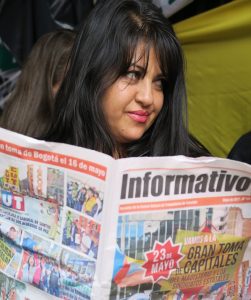
Photo: Jørgen Laurvig
Polarised media an obstacle to Colombian peace-accord
By Jørgen Laurvig, media consultant
“It’s a lot safer to be a journalist and fewer media workers are killed. But there’s still a long way to go for the press in Colombia, before we’re truly free.”
These are the words of a Colombian journalist working in the conflict zone around Villavicencios, some two hours by car from Colombia’s capital Bogotá.
Since the left-wing guerrilla FARC (Fuerzas Armadas Revolucionarias de Colombia, Colombian Revolutionary Armed Forces) and the government of President Juan Manuel Santos signed the second and final peace-accord on 24 November 2016, conditions for the press have generally improved.
However, while murder and physical violence targeting journalists is declining nationally, local pressure on journalists remain. This is especially pertinent in regions where local authorities have direct links and ties to media owners and editors, asserting pressure on journalists by asking them to reflect certain points of views and conveniently neglect others in their reporting.
There is also a growing tendency to exert financial pressure on media that do not “tow the line”. Local authorities might threaten publishing houses to outright cancel their public advertisement agreements on which media depend as their single most important source of income. Politicians have also reportedly asked local businesses to withdraw their advertisements in independent media when becoming corss with certain media outlets. A decline in income from advertisements might not only lead to editorial restraint, but also means longer hours and lower wages for reporters.
Threats to editors are reportedly common, and local and regional corruption also affects and in some cases even involves local or regional media. Both local politicians and public servants employ threats through anonymous phone calls and emails.
Additionally, local army commanders have pushed media owners, editors and journalists to publish or change news in the interest of the army.
On 2 October 2016 voters in Colombia shook the world by rejecting the proposal for a peace-accord. The result forced the government and FARC to return to the negotiating tables and revise the peace agreement.
Opposition to the peace efforts is led by former president Uribe. His politics reflect the political interests of landowners and business people in different rural regions, but also that of drugs-cartels, politicians, landowners and the business community known to have used paramilitary groups to fight the guerrilla and displace peasants from their small farms. Estimates on the number of internally displaced people runs as high as seven million. Land-grabbing will be reversed by the implementation of the peace-accords, so huge economic interests is at stake.
There are media outlets supporting the opposition to the peace-accords, so the media end up being as polarised as the political parties.
“No major news actor tried to promote the peace-accords wholeheartedly, and the polarised coverage of media is making reconciliation between the political actors less likely. If the media could lower its pitch, it would defuse the conflict,” one journalist points out.
Another problem for local media is the absence of state powers in areas formerly controlled by the FARC. This leaves room for a motley crew of former paramilitary, right wing groups turned criminal gangs (widely known as bacrim, short for “bandas criminales”), traditional drug gangsters and in some areas the smaller left-wing guerrilla group ELN (National Liberation Army, Ejército de Liberación Nacional).
Summing up, even though killing and threats to journalists have decreased on a national level, danger is rising in other areas. The impression, however, is that traveling is safer for journalists in general. However, the economic hardship of media is growing and endangers the quality and an independence of the media, regardless of their geographical location, platform of choice and the size.
Jørgen Laurvig is a Danish journalist who has been working as a consultant for IMS on Latin America-related matters. The above article is Jørgen Laurvig’s assessment of the situation following a trip to Colombia and interviews with members of the Colombian the media sector.
Background:
Since the peace agreement was signed in August 2016, IMS has been working with local partners to help build the capacity of the media to play an active, fair and balanced role during the transition process. In the coming months, IMS and its partners will be working hand-in-hand with the media industry to implement a holistic safety certification process to ensure that the media create effective safety protocols.




